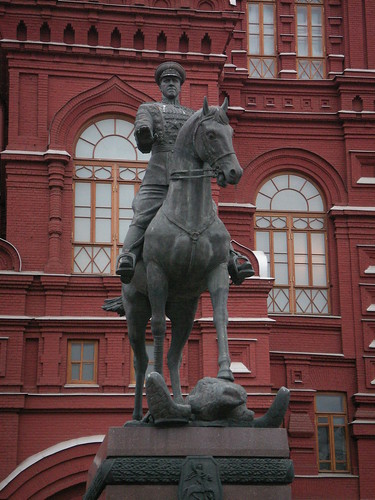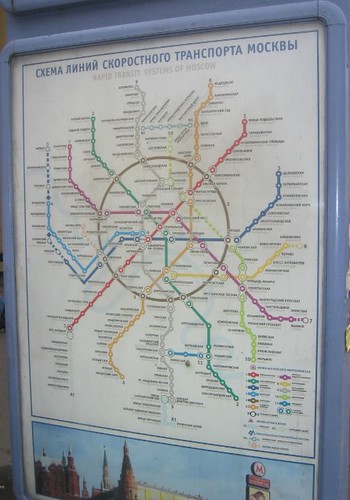Editor’s note: What? Isn’t Short Story Month over? Yes, it is—but that doesn’t mean we stop loving short stories. So here’s an encore round of “Stories We Love.”
In “Map of the City,” a story from her new collection Separate Kingdoms, Valerie Laken portrays the life of an American college student in perostroika-era Moscow. The story is brilliantly structured—the names of Moscow metro stations head the various sections, each of which captures a new moment in time and space and thereby mimics the experience of using the subway: you descend into one station and resurface at another.
Perestroika, after all, was a time of change and restructuring, and in the early-nineties Soviet Union you might go to sleep in one sort of nation and awake in an entirely different one. “We’re in the heart of the biggest country in the world with its eleven time zones and fifteen republics, its thirty thousand nuclear warheads,” the narrator thinks. “And for today at least, nobody knows who’s in charge.” Language, too, seems to be fleeting. For instance, when the narrator learns the Russian word for solstice, she repeats the word to herself but knows that in an hour it will have vanished.
 “The country no longer exists, but the city remains,” one section begins. “A country is just an idea, its borders only visible in your mind and on maps.” The story suggests maps are just ideas, too, superimposing order, logic, and stasis on an ever-changing, dynamic place. In a city like Moscow, to say you live near a certain metro stop means everything to someone familiar with the place and nothing to someone who is not. And yet it’s the streets “covered in slush,” the crowds that “dwindle and swell,” the “clusters of women” and the tall-standing statues of poets and the soldiers who peek out of the hatches of the tanks that really are the place—the place Laken masterfully evokes.
“The country no longer exists, but the city remains,” one section begins. “A country is just an idea, its borders only visible in your mind and on maps.” The story suggests maps are just ideas, too, superimposing order, logic, and stasis on an ever-changing, dynamic place. In a city like Moscow, to say you live near a certain metro stop means everything to someone familiar with the place and nothing to someone who is not. And yet it’s the streets “covered in slush,” the crowds that “dwindle and swell,” the “clusters of women” and the tall-standing statues of poets and the soldiers who peek out of the hatches of the tanks that really are the place—the place Laken masterfully evokes.
The beginning of “Map of the City” is so gorgeously vivid that it almost feels like an ending, alight and crackling, its own midsummer night’s dream. The story begins on the feast of John the Baptist; ten o’clock at night and the sun has not yet set. According to the narrator’s books on Russian culture, which also serve as a kind of map, detailed yet sometimes ultimately uninformative: “[T]his is the night when everyone pours into the forest and stays out till dawn jumping over bonfires and searching for magical fern blossoms.” The characters, five Americans and six Russian students, visit the forest, but nobody else is there. The rest of the city pours out from the metro and moves not toward the woods but its large blocky apartment structures, highlighting the disconnect between visitors and those who move in a place’s real underbelly, a distinction that blurs, defines, and alters as the story progresses.
The students’ collective experience is its own mini cultural exchange. One of the Russian students says, “‘I read somewhere that in America you can tell what kind of person someone is by the type of car he drives.’” The absurdity makes all the characters laugh, but both the narrator and the reader see the truth in the statement. It is bizarre, we think. And so true. “There are lots of things I can’t tell them about my country,” the narrator notes.
She also reveals how when you think you understand a place, you discover another layer to it:
I once heard a rumor about a second, secret metro system that supposedly runs below this one, designed to evacuate the most important people in the event of—here Russians stop the story, because what they were about to say would be impolite—in the event that your country annihilates us with those weapons.
Such details show not only the city’s unknowability but also its sense of urgency. When the narrator’s friend Andrei tells her, in the middle of what turns out to be a coup, not to worry, she points out that the phrase literally translates as “Don’t uncalm yourself.” The beautiful confusion of this idiom—I repeated it to myself over and over—implies that her state of rest is calm and any deviation from such is unnecessary, trivial. Yet anyone who’s lived in or visited a foreign country knows that very little time is spent in such a state. Unless it involves gated resorts and drinks with tiny umbrella garnishes, often to travel is to uncalm yourself. You may experience tranquility and joy, but the sheer extra work your mind does to translate and transpose generally cannot be described as calm.
And the narrator doesn’t necessarily want calm. She wants to live. When her classmates are hesitant about going out during a time of unrest and protest, she forges ahead, believing she has nothing to lose. And she wants to live like a native.
 But like many expatriates, desperately wanting to fit in often makes us stand out all the more. The longer we are abroad, the more we cling to other expatriates—not because they remind us of home but maybe because they, like us, are homeless, not a part of either culture but instead forming another one altogether, using the slang of the new land while eating the Frosted Flakes of the old. Laken’s narrator asserts to Jacob—an American expatriate who seems to know more about Moscow than anyone—how well she knows the geography of the city, challenging him to quiz her on any part of the metro.
But like many expatriates, desperately wanting to fit in often makes us stand out all the more. The longer we are abroad, the more we cling to other expatriates—not because they remind us of home but maybe because they, like us, are homeless, not a part of either culture but instead forming another one altogether, using the slang of the new land while eating the Frosted Flakes of the old. Laken’s narrator asserts to Jacob—an American expatriate who seems to know more about Moscow than anyone—how well she knows the geography of the city, challenging him to quiz her on any part of the metro.
But the metro, Jacob tells her, is “tourist stuff.” We wonder then if it’s not the metro that defines the city but the river; the metro creates separate little kingdoms that are difficult to conceptualize as one whole (much like the republics that emerged and redefined themselves after the fall of the Soviet Union, after all). Maybe the rumored secret subway runs along the river in its haphazard, evasive way, like the missing part of a culture or language or place you think you’d understand if only you could figure it out. The one you never got around to memorizing, or if you did you could only hold it your mind for so long, like the Russian word for solstice, never yours to begin with.
For the first time you understand why the word language so often comes from the word tongue. Of course it’s this base writhing thing you survive on, this thing that unfurls from your core, where you can’t see its origins. You can try to escape yourself, but you’re still here.
You’re still here! Laken’s awareness of the tension between transience and permanence creates the beauty and complexity of this story. And this tension also creates the wonder of uncalming yourself in a new place, the thrum and magic of bonfires and the forest and magical ferns, the possibilities inherent when you descend in one place, arise in another, and study a map to see if you can find yourself.






